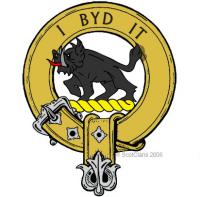
Clan Nesbitt
Records of the name Nesbit can be traced back to the 12th century in the Barony of Nesbit in Berwickshire. The area itself possibly taking the name from a nose shaped hill. Variations of the name, however appear in older documents: William de Nesbite is recorded as witness to a charter by Patrick, Earl of Dunbar, to Coldingham Priory in 1160. Thomas Nisbet was also Prior of Coldingham from 1219 to 1240, Philip de Nesbit along with James, John and Adam Nisbet appear in the Ragman Roll of Edward I in 1296.
Adam Nisbet of that Ilk, received a charter from Robert the Bruce to the land of Knocklies on the condition he provided one knight for the Kings army. The Nesbitt name continued to support the cause of many Scottish Kings from this time onwards. Alexander Nesbitt, was a keen supporter of Charles I and served for a period as Sheriff of Berwick. at the outbreak of civil war however he joined up with the Royalist forces along with his son Phillip who commanded one of Charles regiments. Phillip fought against the Covenanters alongside James Graham, Marquess of Montrose but was captured at the Battle of Philiphaugh and later executed in Glasgow. Phillip also lost two brothers; Alexander and Robert during these wars however his youngest brother Adam was spared and his son Alexander Nisbet became one of the most respected heraldic authorities. His famous work, System of Heraldry, was published in Edinburgh in 1722. He died in 1725.
Other branches of the Nesbitt family were the Nisbets of Paxton, Dean, Dirleton and Cairnhill. The Dirleton family produced many eminent lawyers and two judges, Lord Dirleton and Lord Eastbank. The Nisbets of Cairnhill occupy a magnificent Adam dwelling known as Drum to the south of Edinburgh. Sadly this magnificent building is not open to the public.
In 1994, the Lord Lyon recognised Robert Anthony Ellis Nesbitt as chief of the name and arms of Nesbitt (or Nisbit). The new chief was able to trace his descent from the Reverend Philip Nisbet, grand-uncle of Alexander, the heraldic writer. He died in September 2000 and was succeeded by his son Mark.






